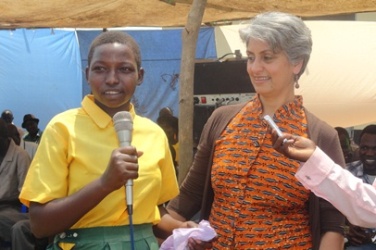E. Equatoria: UNICEF calls for increment in school enrollment
By Julius N. Uma
July 22, 2012 (OWINYKIBUL) – The country representative for the United Nations Children Fund (UNICEF) on Friday urged parents in South Sudan’s Eastern Equatoria State (EES) to send more children to school and improve the low enrollment rate in the region.

The construction of the school, officials say, will enable hundreds of children both from within and outside the region to access learning, some for the first time in their lives.
“Out of every 10 children of the school going age, only three are attending schools in Eastern Equatoria, which makes its enrollment the lowest in the 10 states of South Sudan,” said Yasmin.
She, however, expressed optimism that the completion of the new school facility provides a unique opportunity for children in the community to attain quality education, but emphasised hard work in reference to the primary school’s motto, “Hard work pays.”
The school, which started operating in 2008 with just 400 pupils, currently boasts of over 1,200, and its enrollment, is anticipated to rise in coming years.
In South Sudan, access to education is still a major challenge to many, with only 27 percent of the population able to read and write, according to the country’s National Bureau of Statistics.
Michel Lotyam, the Eastern Equatoria Minister for Education, while speaking at the same event decried the low education levels in the state, which he largely attributed to both the social, psychological and physical effects of two decades of devastating civil war.
“We were affected by long years of war as everyone knows, but apart from that we still have certain cultures and traditional beliefs among our communities which hinder education of children,” he said.
“For instance, more girls enroll at the early stages of primary education, but tend to drop out as they advance upwards,” the minister added, while emphasising the importance of educating girls, as well as boys.
The education minister, however, urged the community in the region to desist from some traditional practices, such as girl’s marrying to young, which he said can lead to serious setbacks to the progress of education.
He thanked the donors for extending support to the region, further pledging commitment from government for positive partnership.
Meanwhile, George Mogga, a director of planning at the national education ministry said government plans to have at least 2,000 primary schools all over the country by 2020.
Also underway, he further disclosed, as well as other education policies, is the enactment of the long-awaited Education Bill for South Sudan.
(ST)
